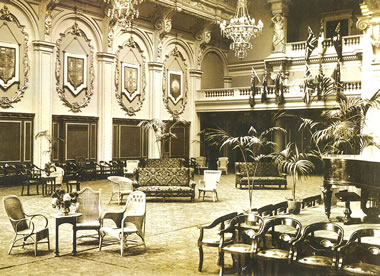| School | Troops | Resources |
The Political Economy Club

The Political Economy Club was founded in London in April, 1821. The leading spirit behind its formation was Thomas Tooke, who hoped to rally support of prominent London figures behind the principle of free trade and to coordinate their influence in parliament to support the 1820 London Merchants Petition.
From the outset, the Political Economy Club was a closed club, and did not seek to reach out to the general public (save for parliamentary circles). It was originally limited to 30 members (increased to 35 in 1847) .
Founding members of the club included politicians, civil servants, journalists and the leaders of the Classical School - James Mill, David Ricardo, Robert Malthus, Robert Torrens and Thomas Tooke. Later members included notables such as Nassau W. Senior, J.R. McCulloch and J.S. Mill and W.T. Thornton.
The Political Economy Club did not have a permanent location. It met originally at Freemason's Tavern on 61-65 Great Queen Street (now the "New Connaught Rooms"), near Covent Garden (w). In 1850-61, they met at Thatched House Tavern on St. James's Street in Westminster. They continued moving around, e.g. from 1861 meetings were held at St. James's Hall (w), then from 1867 at Willis's Rooms (w), then in 1877 at Pall Mall restaurant (w), after 1880 at the Inns of Courts Hotel (near Lincoln's Inn w). It now meets at the Royal Automobile Club on Pall Mall (w).
The Political Economy Club met every month on the first Thursday (changed to Friday c.1880), from February to July, plus December. The proceedings of the club involved members submitting a question for discussion (usually revealed a fortnight or so in advance), related to a particular economic policy, or the progress of economic theory, which was to be discussed in an evening banquet dinner (starting at 7:30 or so). Proceedings were tightly regulated. There was no lecturing, the chairman introduced the question, and the fist discussant had a 25-minute limit, and subsequent discussants, upon demanding the word, could not exceed fifteen minutes. The whole meeting usually lasted a little over an hour. The minutes of the discussions were recorded, but not published. The PE Club had no active publication outlet - it sponsored the reprinting of old scarce tracts in political economy, but that was about it.
The Political Economy Club would later include, as honorary ex officio members, the sitting chairs of political economy at the major English universities - which in the 19th Century meant Oxford, Cambridge, University College London, King's College, London and Owens College, Manchester. The invitation was extended to the economics chairs of the Irish and the Scottish universities. Some prominent British politicians (usually Whigs/Liberals) were also made honorary members by virtue of their ministerial office, e.g. William Gladstone, Hugh Childers, Viscount Goschen, George Shaw-Lefevre, Arthur Balfour, etc.
Despite its closed nature, the Political
Economy Club was a domineering influence in 19th C. economics. But its
exclusivity prevented it from becoming a wider association for economists. That
role was filled by Section F of the BAAS
(founded1832), the Statistical Society of London (f.1834), the
Cobden Club (f.1866) and finally the the
British Economic Association (f.1890).
|
Founding Members of the Political Economy Club (1821)
Selected later members (with date of admission)
Honorary Members ex oficio: (limited to six from the following list)
|
| HET |
|
Resources on the Political Economy Club
|
All rights reserved, Gonšalo L. Fonseca
